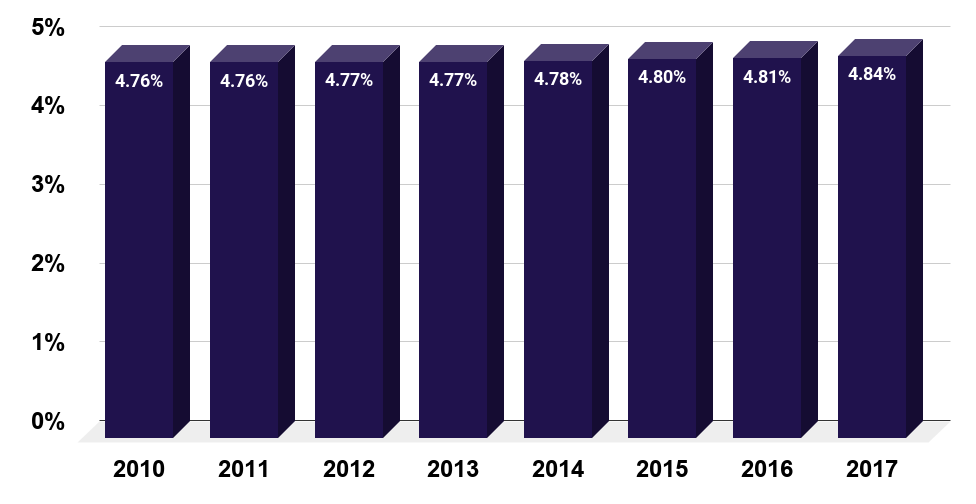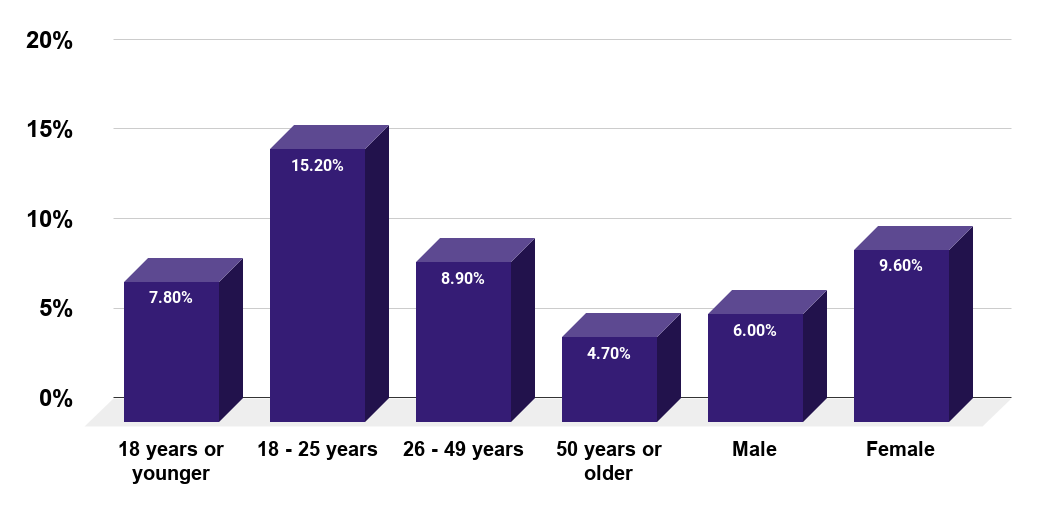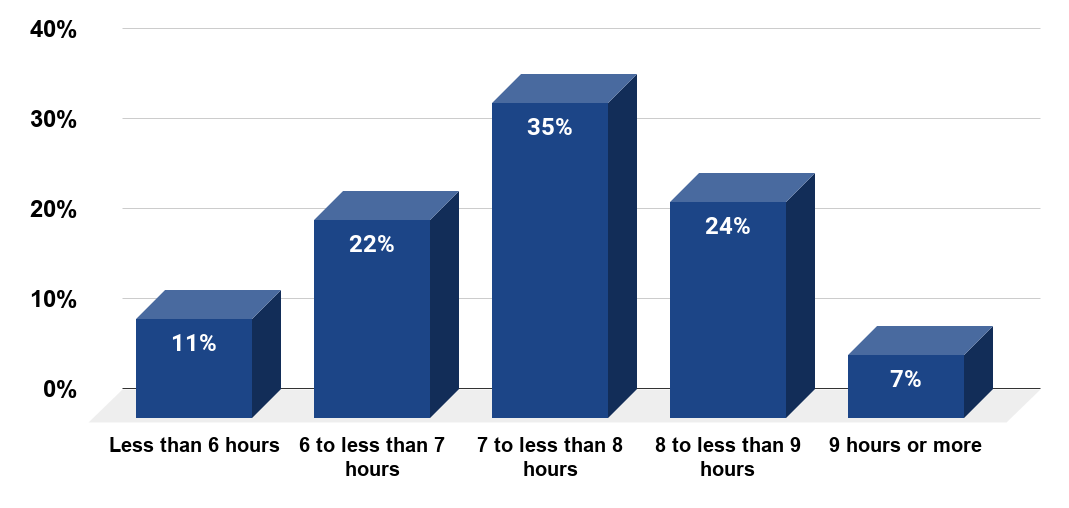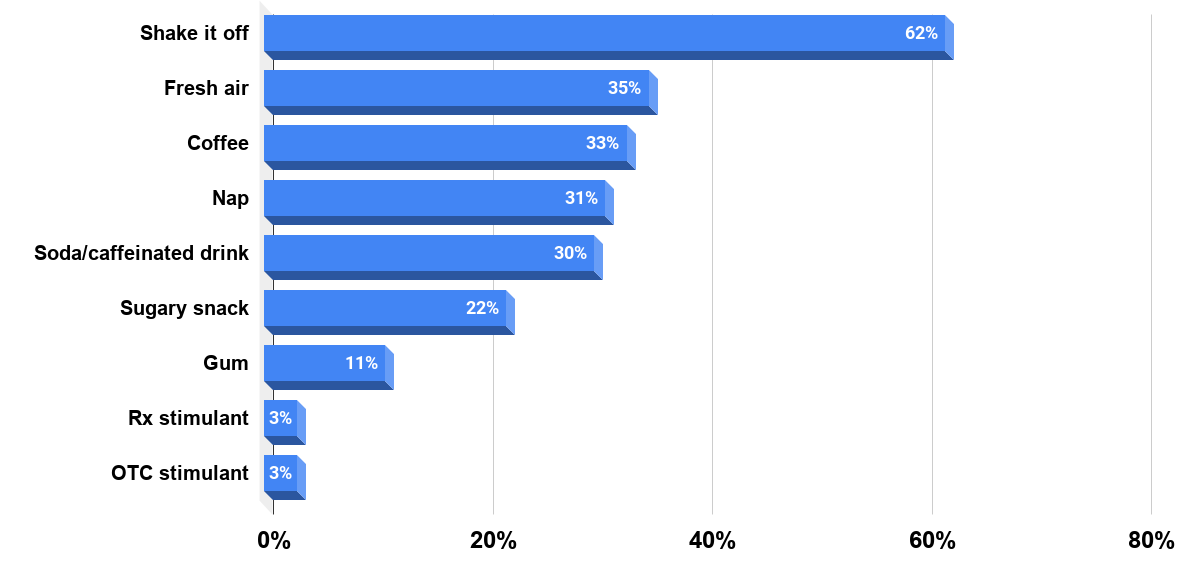Why Do Depressed People Sleep So Much?
WhatToGetMy Instructional Article
- This article will provide you with answers to the questions of depression and oversleeping, and depression and fatigue. It will also help you understand the subtle differences between the three.
Percentage of people in the U.S. who suffered from depression from 2010 to 2017. Source: Statista

Percentage of U.S. adults with a major depressive episode in the past year as of 2019, by age and gender. Source: Statista

Depression is a serious health concern/issue in America. The seriousness of the issue comes out starkly from the two surveys represented in the two charts above. Between 2010 and 2017, it would seem to suggest that the rate remained somewhat fixed in the 4% region. And then two years later, it appears to have shot up especially among the younger age group of 18 – 25.
What could have caused this one might ask? The cause is uncertain and does not come out from those surveys and that is why in this article, we want to help you unpack the subject of depression and sleeping a lot and/or tiredness. Knowing the differences between depression and oversleeping and depression and fatigue will help you to understand when to get help should you suspect you may have a case of depression.
What does it mean when someone sleeps a lot, and is oversleeping or sleeping a lot a sign of depression? Depression versus oversleeping for other reasons.
Number of hours of sleep U.S. adults aged 40 years and older needed to function at their best during the day as of 2016. Source: Statista

Getting enough sleep is essential to being able to function properly and optimally and live a longer life. From the above survey sourced from Statista, 35% of American adults surveyed who were aged 40 years and above said they needed at least 7 hours of their sleep to be at their best. Sleeping for at least 7 – 9 hours is not just peculiar to the persons surveyed in the above chart. It is also the scientific benchmark for the total hours an adult should sleep for, also confirmed by the Center for Disease Control and Prevention on their website here.
What this means is that generally speaking, anything above 8 – 9 hours is or would be considered to be oversleeping and/or sleeping a lot. And for most people, especially persons who need to constantly be at work, oversleeping/sleeping a lot can be fatal to meeting a deadline and the likes. And that is why at least 33% of Americans (from a 2019 survey sourced from Statista and shown in the chart below) take coffee in a bid to avoid sleeping a lot, while at least 3% go to extreme measures of taking an Rx stimulant.
Percentage of adults in the U.S. who took select actions to deal with sleepiness in 2019. Source: Statista

You may be affected by the bug of suddenly finding that you sleep too much on some occasions or oversleep. This would understandably cause you some concern and lead to asking the question of whether your oversleeping/sleeping a lot is a sign of being depressed. It may also make you resort to finding solutions such as the ones shown in the last chart above.
It is important to understand that sleeping a lot on its own does not mean someone is depressed. While sleeping a lot or too little can be one of the symptoms of depression, it is not always the case that when you find yourself or someone sleeping a lot then they are depressed.
Here are 5 other main reasons why people sleep a lot or oversleep, that has nothing to do with depression:
1. They could be sleep-deprived due to being overworked.
Because the body is wired to look forward to receiving at least 7 – 9 hours of sleep every night for it to recuperate and feel well-rested, it often kicks back when you deny it these hours consistently. And the way it kicks back is by making you very tired that you shut down and find that you may have slept for an entire 12 hours. That is the body’s way of looking out for itself and warning you that you are on the verge of a physical breakdown and need to slow down.
So before you start thinking you’re depressed, look back at your sleep pattern before now. Have you consistently been sleeping for less than 7 hours at least? If you discover that you have only been getting between 4 – 6 hours of sleep, don’t be surprised when you get hit with a bout of oversleeping for maybe a week or it comes on and off. Your body is trying to tell you that you are sleep-deprived and denying it what is due to it in terms of hours of sleep. In such cases, you shouldn’t be worried but just adjust your sleep patterns to get adequate sleep.
If however, you find that in addition to oversleeping you are having other symptoms like being disillusioned with life and just generally hating life or your life, then you should be somewhat concerned that it could be more than being sleep-deprived and may be borderline depression.
2. They are exhausted/tired as a result of working too hard.
This goes hand-in-hand with the first reason. Usually, when people sleep for short periods, it is mostly because they are working or overworking themselves. And when you do this over an extended period, it takes its toll on the body and leads to general or extreme fatigue and/or tiredness. And the body’s first response to fatigue/tiredness is always to sleep. You feel so tired that you can’t seem to help yourself but doze off. And where you doze off because of tiredness your body will ensure that you get the right dose of sleep before you can wake up. And usually, that right dose almost always means oversleeping so that you catch up on lost sleep time.
3. It could also be a function of their age.
The older we get as humans the longer we want to sleep. This appears to be another natural biological function/process of the body. And this is especially exacerbated in those persons who worked extremely hard while they were younger and slept very little as a result. And for some of those people, they would have resorted to things like caffeine to ensure they keep cheating the body and getting away with being sleep deprived.
Where this happens to be the case, when they eventually slow down at an older age, the toll of earlier years will catch up and they will find that in most cases they sleep for very long hours. It is nothing to be concerned about. The body is simply doing what it does best – looking out for itself.
If what we have described here explains your case of oversleeping, then you have nothing to worry about.
4. In the case of a woman, she could be pregnant or suffering a hormonal imbalance due to her period or other health reasons.
One of the signs of pregnancy or a woman’s monthly period is usually oversleeping (and lethargy in some cases). It could also be a result of a hormonal imbalance or other health issues. As a woman, if you suddenly feel an onset of oversleeping out of the blues, it is worth thinking in this direction and checking that any of these could not be the reason.
You may like these related articles on Relaxing gifts for new moms and Gift sets for new moms.
5. They have a medical condition aside from depression that you (or even them) may not be aware of.
Other medical conditions that could cause a person to oversleep include type 2 diabetes, heart disease, headaches, and obesity. If you have any of these health conditions, you will find that you are prone to oversleeping. If you are not sure about the state of your health, a visit to the doctor will be a good place to start in trying to unravel the mystery of why you are oversleeping.
And if on the flipside of the coin you find that you are not getting enough sleep and need help with it, check out our very helpful article on Best gifts to help sleep for very helpful things you can still that are also healthy.
Why does depression make you sleep so much? Depression and oversleeping.
With the above said, however, oversleeping or not sleeping enough, is one of the many symptoms of depression. Depression can either cause you to oversleep or to not sleep enough.
Depression makes you sleep too much because of the toll depression and the other symptoms of it take on your body.
A depressed person is generally weighed down with the weight of all the issues that are bogging them down. This leads to other symptoms like being irritable and having serious mood swings, having a loss of appetite, and just being generally disinterested in life.
When all these symptoms are compounded, you have a person who is mentally and emotionally exhausted without realizing it. That mental and emotional exhaustion then takes its toll on the body leading to physical exhaustion. And when the body itself gets exhausted to that extent, its response is to sleep and in most cases, oversleep.
Check out this very helpful related article on How to stop thinking while sleeping to help you with getting a peaceful sleep undisturbed by overthinking.
Can depression cause extreme fatigue, tiredness, and is tiredness a sign of depression? Depression versus fatigue for other reasons.
Depression does cause fatigue. Fatigue is one of the main symptoms of depression. However, it is important to understand that not all fatigue means a person is suffering from depression. Fatigue is a symptom of two other important issues that has nothing to do with depression:
6. You are overworked.
This is the main reason why people get extreme fatigue/tiredness. If you’re constantly working at least 10 – 15 hours every day with no pauses or breaks in between, it is only a matter of time before extreme fatigue/tiredness sets in.
Before you put your extreme fatigue/tiredness to depression, evaluate your life to be sure that this is not the reason. Being overworked can also make you irritable, and that would not mean you are depressed.
If however this is also coupled with feeling low and not happy with your life then you should be a little concerned and see a doctor because those extra symptoms could signal the onset of mild depression.
7. You are unwell/have a health condition that is unrelated to depression.
In the case of women, for instance, feelings of lethargy during their period or when pregnant can make them feel extreme fatigue and/or tiredness. Other health conditions unrelated to depression, like headaches, fevers, and the likes would make you feel extremely tired and unwell. Again, it will be important to see a doctor if you feel very tired and cannot pinpoint any health condition you are aware of that could be responsible for it.
Why does depression make you feel tired? Why depression makes you tired.
As was pointed out in the earlier section, the other symptoms of depression take a toll on the body. This would in turn lead to fatigue and/or tiredness. This is the main reason why or how depression makes you tired.
How can you deal with oversleeping and fatigue/tiredness as a result of depression?
First things first, you need to be sure that your oversleeping and/or fatigue is attributable to depression. Once you have ruled out all the other causes that we have mentioned in the earlier sections, then your best solution is to deal with the depression you feel.
You have to tackle the depression itself because the issue of oversleeping and fatigue are not the problems themselves. They are merely the symptoms, and treating the symptoms will not make the problem go away. And if the problem is not dealt with and eliminated, the symptoms will persist.
To deal with depression, especially when it has become serious, the best solution is to seek professional help from a therapist.
A therapist will help talk you through what could be have triggered the onset of the depression. Sometimes it could be a tragic loss (of either something valuable like a job or a loved one). For others, it could be the onset of a midlife crisis. And in other cases, it could just be an unresolved issue from the past.
Whatever the reason might be, talking to a therapist will help you figure it out. And once you have figured it out, the therapist would be able to help recommend any steps or treatment that is tailored to your specific needs.
You will notice that once you deal with the depression itself, the symptoms of fatigue and oversleeping will disappear. It will also be useful to read this helpful article on How to remain positive in difficult times to help you with keeping a positive outlook on life. A positive outlook is one guaranteed way of keeping depression at bay in one’s life.
If you suspect that a midlife crisis might be the reason for your depression, our articles on What is a midlife crisis for a woman and Male midlife crisis stages can give you a headstart on finding solutions before seeing a therapist.
Frequently Asked Questions.
- 1. Why do I sleep so much when I’m depressed?
It is because of the toll the other depression symptoms are taking on your body. This in turn makes you feel tired. And when you are tired, your body’s natural response is to sleep a lot to dull the pain and tiredness.
- 2. Depression makes me sleepy, what should I do?
Tackle the depression itself and you would solve the problem of being sleepy. This is because being sleepy isn’t the problem but a symptom and fixing the symptom won’t make it go away where the problem persists. Check out the section in this article on how you can tackle the depression itself.
- 3. I have a lack of energy and am always tired, does it mean I am depressed?
Not necessarily. There could be other factors at play and we list other factors that could cause fatigue in this article. Evaluate yourself to be sure that you don’t have these other underlying causes. Only once you’ve ruled these out can you conclude it is depression. Whatever the case, it is important to see a doctor immediately so that they can help you pinpoint the exact cause of the symptoms.
- 4. Can depression make you tired all the time?
Yes, if you are suffering from depression it will normally make you tired almost all the time because of the toll the other symptoms take on your body.
- 5. What does tired all the time depression mean?
It can only mean that your depression is no longer a mild case but a bad case of depression. And that means you need to get professional help as soon as possible.
- 6. Do depressed people sleep more?
Yes, depressed people tend to sleep a lot most of the time.
Closing Thoughts.
Depression is a serious health issue that should not go unchecked. If on evaluation with all that has been set out in this article you realize you are dealing with depression, it is best to get professional help right away. Left unchecked, depression can lead to other mental and health problems that would lead to a degeneration of your general quality of life.
01 HOUR 10 MINUTES
ESTIMATED TIME DESIGNING AND UPLOADING THIS ARTICLE
06 HOURS 29 MINUTES
ESTIMATED TIME RESEARCHING AND WRITING THIS ARTICLE
You Might Also Like


